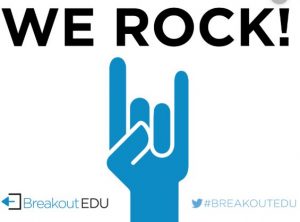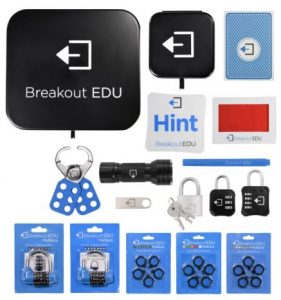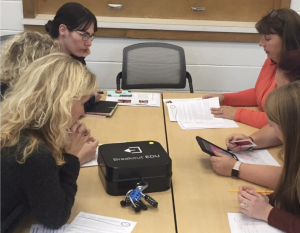One of the most popular posts I have written over the past few years was a collection of Learning Skills comments I put together. It continues to get views and comments regularly, but like most of us, I cringe when I look back on what I wrote three or four years ago. They’re not bad comments, I just feel like I’ve learned so much since then.
So I’m back! With more comment samples for you! You’re free to use these – modify them, mix and match them, grab one or two sentences, whatever you like! These are here to help you and give you an idea of how one teacher in Ontario writes their comments. I’ve also posted some FSL comments for the Core and Immersion teachers out there.
Profile: strong learning skills, good leadership qualities, regularly engaged in class, working on developing more confidence
It has been a pleasure having (NAME) as part of our classroom community this year. She is an enthusiastic, hard-working student who always strives to do her best. During lessons, she listens attentively and regularly offers her insights, although at times she seems unsure about her answers. As her confidence builds, her active participation increases, and she should be very proud of her accomplishments to date.
When working independently, (NAME) makes good use of alternative workspaces (e.g., the library, the hallway) to provide her with a quiet space for working. While she occasionally allows herself to get distracted by socializing with her peers, a quick reminder is often all that is required to return her attention to the task at hand. She makes good use of success criteria and learning goals to ensure that her work is meeting expectations.
Collaboration is one of (NAME)’s strengths. She often takes on leadership roles when working with peers, such as organizing what needs to be done and creating a plan to ensure the group is successful. Her kind, open-minded personality allows her to work with any student without issue. On the rare occasion that conflict arises, she is always able to find a solution without assistance.
(NAME) has become a strong role model for her peers. Her dedication and cheerful disposition are great assets to our school community. Keep up the great work!
Profile: weaker learning skills, not fully engaging in French Immersion program, finds academic demands challenging, tends to shut down when encountering difficulty
(NAME) is a kind, compassionate student who is beginning to develop more confidence in his abilities. When he feels certain that he is on the right track and understanding the material, he is an active participant in class discussions. Much of the time, however, he requires frequent reminders from teachers and peers to engage in respectful listening behaviour, as he is often chatting with friends or playing with objects during lessons. Given that he often seems to feel overwhelmed by the expectations of the Middle French Immersion program, particularly during subjects where French is the language of instruction, he would benefit immensely from listening more attentively to his teachers and peers.
(NAME)’s independent work has been inconsistent this term. Much like during class discussions, when he feels confident about his abilities, he is able to complete his work with some support and extended time limits. Most of the time, however, he is quick to become frustrated if he encounters difficulty. Once this happens, even with encouragement and one-on-one support, he often refuses to complete his work. Next term, he is encouraged to seek opportunities to work with his teachers (such as sitting at the round table during independent tasks) where they can more easily check in with him and assist him with his learning.
Collaboration is similarly inconsistent for (NAME). He is most successful when working in groups created by the teacher, as he is less likely to become distracted by socializing. When working with friends, however, he needs frequent reminders to return his attention to the task at hand. He would benefit from reflecting and making careful choices about who he chooses to work with for collaborative tasks.
(NAME) is developing some self-regulation strategies to assist him with his learning skills and habits. When he chooses quiet workspaces away from friends or makes use of classroom tools like noise-cancelling headphones, he is more successful. He is encouraged to continue making use of these accommodations over the second term to help him focus on his learning.
Profile: strong learning skills, good leadership qualities, tends to go overboard on projects
It has been a pleasure to teach (NAME) this year. She is a cheerful, kind student who demonstrates great curiosity for learning. She is an active participant in class discussions and collaborative tasks, quick to make connections and think critically about what she is learning. Her leadership, reliability, and flexibility have all been wonderful additions to our classroom community.
Collaboration is one of (NAME)’s strengths. While she strongly prefers to work with her friends, she is able to work with most students without conflict. Her conflict resolution skills are well-developed and she is generally able to resolve any interpersonal conflicts without needing to involve her teachers. She is a good leader who tries to ensure that all members’ ideas are included in the planning of group tasks.
When completing projects, (NAME) is usually quick to come up with creative, outside-the-box ideas to extend her learning. That said, sometimes these ideas become too large or complex to complete within the given timeframe. When this happens, she has a tendency to ask for additional time rather than adjusting her plans. Next year, she is encouraged to plan in such a way that she can adjust and scale back the plan rather than requesting extra time, as additional work time for one project results in lost time for other instruction.
All the best next year, (NAME)!
Profile: student who tends to rush, engages in discussion on topics of high interest, needs to work on collaboration
It has been a pleasure having (NAME) as part of our classroom community this year. She is a creative, enthusiastic student who always brings a unique perspective to our class discussions. She participates actively in most class discussions, although at times requires reminders to put away her book in order to give her full attention to the lesson.
When working independently, (NAME) is at her best when she is highly engaged in a task, such as tasks involving environmental issues. When her interest in the topic is high, she puts significant effort into her work and eagerly shares her knowledge with her peers. Conversely, when the topic is less interesting to her, she has a tendency to rush through her work in order to finish quickly and move on to something new. Overall, she takes feedback well when it is about specific criteria that she overlooked, but she is reluctant to go back to add more detail or expand on her thoughts. She would benefit from taking time to review her work, ensuring it is detailed and meets the success criteria for the task.
When collaborating with others, (NAME) strongly prefers to work with her close friends and requires considerable encouragement to engage fully in other groupings. She occasionally needs redirection to stay on task during group work, as she sometimes goes to find her friends’ groups to chat. She is encouraged to approach collaborative work with a more open mind next year, as she is a valuable group member with a wealth of knowledge to share.
And a few other snippets you may find useful:
During independent work periods, (NAME) can generally be counted on to stay on task, though he needs occasional reminders not to get caught up socializing with his peers. His willingness to seek assistance or clarification has increased since the beginning of the year, and we hope that he continues to come forward when he needs guidance with a task. Though his resilience is improving as the year progresses, (NAME) continues to become frustrated with himself when he finds a task difficult. Once this happens, he is sometimes receptive to teacher assistance and feedback to help him work through the task. Next term, he would benefit from taking advantage of opportunities to work nearer to his teachers (such as at the round table) during independent work periods to provide him with opportunities to check in more regularly while working.
(NAME)’s greatest area of need this term has been in developing positive collaboration skills. She strongly prefers to work with her friends and is reluctant to fully engage in group tasks with some students, sometimes going as far as to ask to work on her own or switch groups rather than work through conflict. She is highly motivated to do well, which sometimes leads to clashes with other students when they have different plans for how to approach a collaborative task. Next year, she should continue to work on “guiding from the side” by helping her group to stay focused and on task while also allowing her peers’ ideas to take the spotlight more often.
I’ll also try to put together some of the comments I’ve written for other subjects, particularly things like French. I find it can be very challenging to know where to begin with Language comments for French Immersion – especially for smaller programs like the one I teach (Middle French Immersion). Hope these are useful to someone out there!


 https://www.breakoutedu.com/
https://www.breakoutedu.com/

